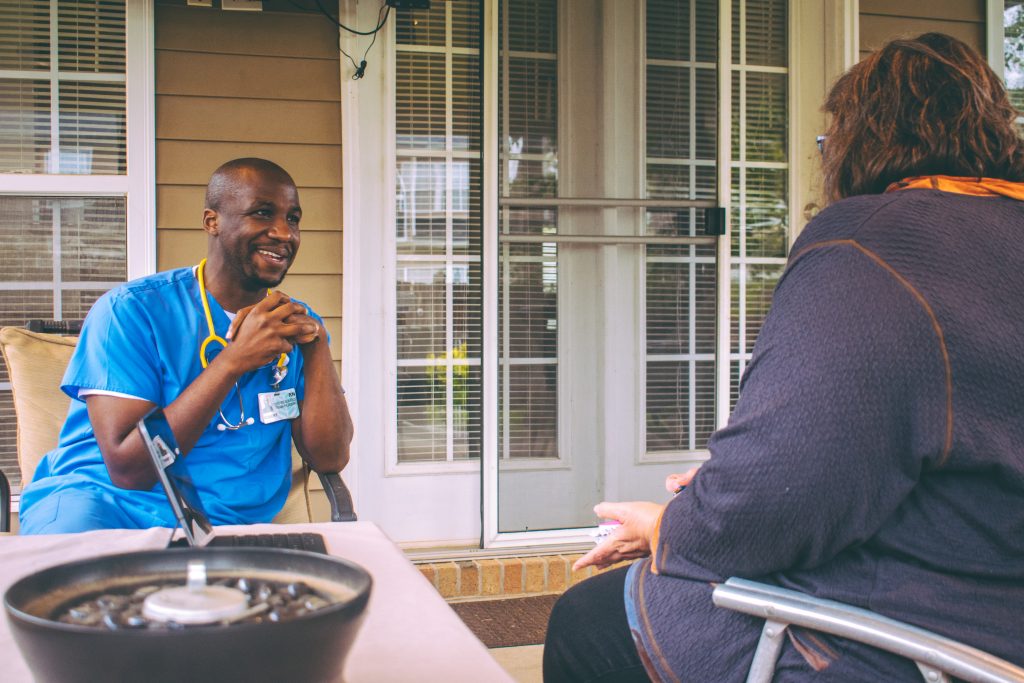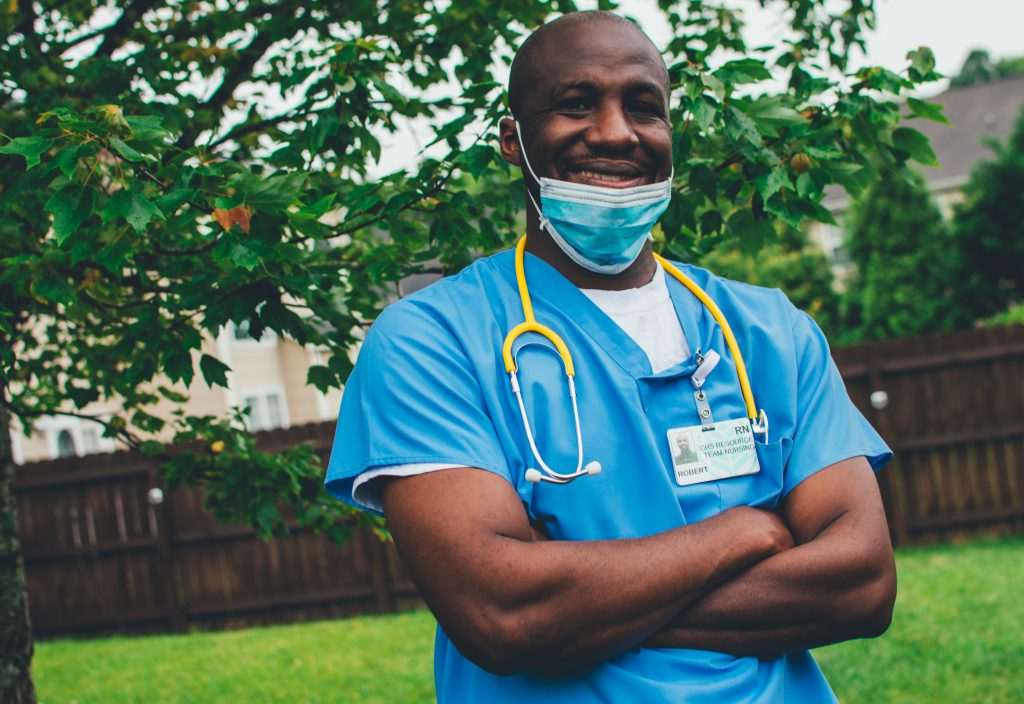The Stories
Mr. Merriwether bears witness to his experiences with a storytelling style that is cadenced and compelling — he can twist and turn a phrase tighter than any switchback on the Blue Ridge Parkway. “I want to share the things my ears heard, the sights my eyes saw, the things my mind had to process.”
He experienced the Unimaginable: a haunting 20-minute ride through a desolate downtown Manhattan, a trip that normally takes hours. “The city that never sleeps was arrested.” The ghost town emptiness contrasted with the beehive busyness of white tents in Central Park filled with hundreds of patients — the Samaritan’s Purse field hospital.
He experienced the Unthinkable. In order to restrict the spread of COVID, Carter Hospital had a strict no-visitor policy. An employee with an iPad on a rolling tripod hosted Zoom sessions for patients and their loved ones. “We need to communicate through touch. At the end of their lives, when people most needed to be held, hugged, and consoled, they were limited to a small amount of screen time. People who were only used to physical touch were reduced to virtual touch — and that’s if their family had access to the right technology and understood how to use it.” To make matters worse, there weren’t nearly enough iPads. “Because of waiting lines, you never knew if your loved one would pass before you got a chance to connect. People had to leave life not being touched physically or virtually.”
He experienced the Unfathomable. “Many in my field suffer from PTSD — they engaged crisis counselors to send to our hotel. We needed help for what we just witnessed. We needed to talk things out, talk things through. Going to sleep at night was scary because you never knew what horrors you would dream about... Some coworkers on the frontline took their own lives. I remember one ER doctor who did. I can understand why she was pushed to the brink — she wanted to escape the reality of being surrounded by the horror of so much death.”
He experienced the Unacceptable. “We went past 18-wheelers, knowing that dead bodies were stacked inside them because there was no place else to put them. Funeral home directors had to tell families that they simply had no place to put their loved ones. There were mass burials. Citizens of the community became numbers, not names. People are not meant to see that much death.”
 The Survivor
The Survivor
How does a nurse survive in the COVID epicenter for 21 days of 12-hour shifts with no days off? Mr. Merriwether had eight to ten patients at a time on ventilators. Most COVID patients on ventilators are mentally alert. But because most are unable to meet their most basic physical needs, such as feeding themselves, they require intensive nursing care. “My PPE made me look like an astronaut! I was chasing alarms all day — literally running from patient to patient. Every time I heard one, I wondered if it would be ‘the’ alarm. It was physically draining, but the workload on my mind was heavier than the workload on my body. To survive, we had to tap into a higher power. I learned to use small windows of available time to pray with coworkers and read my Bible — that was fuel for my journey.”
“There’s no way I would have made it without Peter, the nurses’ union president,” he continues. “He was a Cadillac of nurses, a true gentleman. He showed us the ropes with kindness and graciousness.” COVID was just as new to the medical profession as it was to the rest of the world. “There was no textbook about how to deal with COVID. We became the textbook.”
People who always look for silver linings are likely to find them, no matter how difficult things seem. And Mr. Merriwether is always on the lookout. He observed, “Some of Carver Hospital’s regular staff had begun to recover from COVID and were coming back to work. The hospital was even able to convert some COVID floors back to clean floors.”
When asked if he would do it again, Mr. Merriwether says, “Without a shadow of a doubt, I would. Our hospital motto is ‘Restoring quality to life.’ To be able to be a micro–fraction of that process is astounding. Somebody had to walk into the unknown and wrestle the darkness of death. I would certainly do it again, and again, and again.”
The Merriwethers’ interest in serving COVID patients didn’t end on Day 21. “What do you do when there is no support group? It’s a scary place to be when you can’t reach out and touch somebody who survived,” explains Mr. Merriwether. “My wife and I started a private Facebook group for COVID patients, survivors, and their loved ones. It’s a place to find encouragement and share encouragement.” If you’re interested, check out COVID-19 Survivors Group.
Teresa K. Cain, author; Mimi Curlee, researcher; and Sabrina Robinson, photographer



 The
The